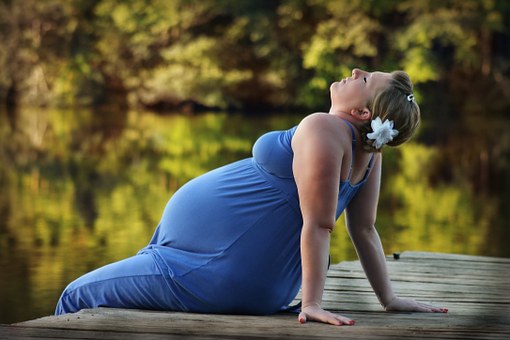By the time you reach Week 28, you’re in the home straight of your pregnancy. Known as the third trimester, this is when your body starts preparing for the arrival of your baby.
Here, Hull’s team of midwives at Hull Women and Children’s Hospital give you advice and tips as you get ready to meet your baby for the first time.
Keeping an eye on you
You’ll see your midwife much more often now as you enter the last stage of your pregnancy.
You’ll probably be aware of a pattern developing in your baby’s movements. Your baby’s movements shouldn’t change at all and it is NOT true that babies move less at the end of pregnancy.
If you think your baby’s movements have changed, call the Antenatal Day Unit (ADU) on 01482 382729 straight away. No matter how many times this happens, you should be asked in for assessment.
 Women having their first baby and those requiring increased surveillance will see the midwife at 31 to 32 weeks and then again at 34, 36, 38 and 40 weeks.
Women having their first baby and those requiring increased surveillance will see the midwife at 31 to 32 weeks and then again at 34, 36, 38 and 40 weeks.
Women who have previously had children and need less monitoring will see the midwives at 32, 36, 38 and 40 weeks.
If your baby still hasn’t arrived by 40 weeks, you’ll see the midwife every week until the birth, who will then offer you a membrane “sweep” in an attempt to start labour.
When you reach 13 days overdue, it may be necessary to start your labour, known as induction. You may be offered a cervical ripening balloon or hormones depending on your individualised plan of care.
Rest when you can but keep active
Your baby is continuing to grow and you could feel really tired. When you sleep, sleep on your side because it’s safer for your baby. Pop pillows behind your back as it will encourage you to sleep on your side.
Despite feeling tired, it’s still good to keep active. Walking is a good form of exercise while pilates and yoga designed especially for pregnant women and aqua aerobics are all good ways of staying active.
Now’s the time to…
If you haven’t already, finalise your birth plan. Think carefully about what you want, chat it over with your midwife and keep an open mind as your wishes can change, even in labour.
You can claim your Maternity Allowance from 26 weeks’ pregnant, although some women prefer to work for as long as they can to save their maternity leave for after the baby is born.
It’s important to use these last few weeks to find time for yourself, so make sure to take people up on their offers of help.
What’s normal and when to seek help
While you might feel excited at the prospect of seeing your baby soon, it’s also natural to feel anxious about the birth. But in months seven, eight and nine, you’ll see your midwife more often as she checks on both you and your baby’s health so tell her how you feel.

You might have indigestion or heartburn as your baby grows and takes up more space. You could also have swelling in your face, hands or feet caused by water retention. You should mention swelling to your midwife or GP to ensure it is not linked to a potentially dangerous condition called pre-eclampsia.
Along with swelling, other signs of pre-eclampsia include high blood pressure, headaches, visual disturbances and protein in the urine. Contact your midwife as you may need to be checked over.
While itching is common in pregnancy, severe itching can be a sign of a rare liver disorder known as obstetric cholestasis. It affects 1 in 140 pregnant women and requires medical attention.
You might start to feel Braxton Hicks as you enter this late stage of pregnancy. This is when your uterus tightens, getting ready for contractions of labour. If they become more painful, longer lasting or more frequent, that’s when you need to call the hospital.
If you think your waters may have broken, it’s always worth ringing the Antenatal Day Unit on 01482 382729 for advice.
Only five per cent of babies arrive on their due date so best get your bag ready if you’re coming into Hull Women and Children’s Hospital to have your baby. Make sure you’ve got all the phone numbers of anyone you’ll need to contact programmed into your phone so you can call them when you think you’re in labour.
What about my baby?
Remember, if you notice any changes in your baby’s movements or have any concerns, contact the Antenatal Day Unit (ADU) on 01482 382729.
Your midwife will start measuring your womb and check on the position of your baby from 28 weeks. Don’t worry if your baby is not in the head down position yet – there’s still plenty of time for them to turn!
Nesting
You’ll be keen to get your home ready for the new arrival and have probably spent time picking out wallpaper, looking at cots and getting everything shipshape. Or perhaps you’re worried about the cost, wondering how you’ll manage to afford everything the glossy magazines tell you you’ll need.
Keep these tips in mind to keep your finances on track. All a baby needs is to be clean and warm. They grow really quickly so there’s no need to have dozens of outfits. In the early days, all you’ll need are six stretchy romper suits, two cardigans, four vests, a shawl or blanket, a sun hat if it’s hot or hat, gloves and socks if it’s cold.
Your baby will need somewhere safe to sleep but avoid cot bumpers, pillows or soft furnishings inside a crib, Moses basket or cot which could be a hazard. Remember it’s best to have your baby sleeping in your room for the first six months.
You can get lots of great bargains at nearly new baby fairs or NCT events. Check noticeboards or community venue websites and Facebook pages for details of sales near you.
You can also pick up some great bargains at car boot sales or from eBay. Baby equipment and clothes are rarely used long enough to get worn out so you can save yourself a fortune if money is tight.
If you’re planning to drive home from hospital or go home in a taxi, don’t forget you’ll need a suitable car seat. But don’t buy second-hand car seats as you don’t know if they’re already been damaged in an accident.
Where can I get more information?
Come along to our HEY Baby Carousel events, held on the last Wednesday of every month between 6pm and 8pm. The next event will be held on Wednesday, July 25.
You’ll get to meet our team of midwives and child care experts, find out how to stay healthy throughout pregnancy, what to expect before, during and after you give birth to your baby and how to take care of your new born in those first few weeks.
Partners are welcome to come along to find out more about the crucial role they will play and how they can look after themselves, physically and mentally, as you both adapt to life as new parents.
Women with Hull GPs can book parenting classes and get more information by visiting our new website www.hey.nhs.uk/heybaby

